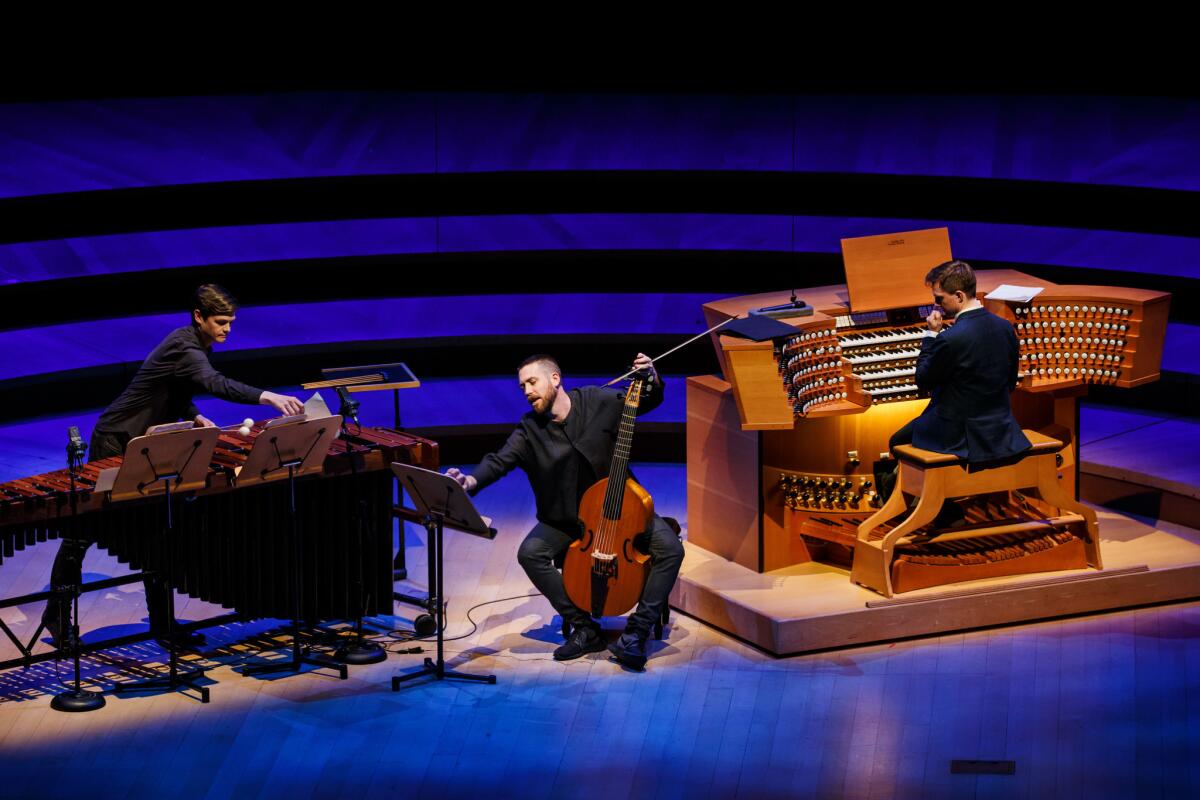Review: A British organist reaches America by way of Reykjavik

- Share via
James McVinnie, who took a turn on the imposing Walt Disney Concert Hall organ Sunday night as part of the Los Angeles Philharmonic’s recital series, has all the qualifications for being a properly British young organist. He is modest in manner. He is an elegantly unshowy player.
Cambridge trained, he has served as assistant organist of Westminster Abbey. He has participated on many a recording of unassuming British sacred and choral music. He played at the 2011 wedding of Prince William and Catherine Middleton, for heaven’s sake.
What makes McVinnie stand out is his involvement with several American composers — Nico Muhly in particular, along with David Lang and Philip Glass (whose music he plays magnificently). So, too, does the fact that McVinnie’s name now pops up next to some of the most arty on the U.S. and U.K. pop scene, since the organist worked with Bryce Dessner of the National, Richard Reed Parry of Arcade Fire, Squarepusher and Martin Creed.
And then there are his hip Icelandic credentials. Reykjavik’s recording collective Bedroom Community has released McVinnie’s stunning first solo recording, which is devoted to works Muhly has written for him. McVinnie also will participate in the L.A. Phil’s attention-getting Reykjavik Festival in April, playing the craggy Icelandic composer Jon Leifs’ 1930 Organ Concerto on a program that also includes the Icelandic band Sigur Ros.
SIGN UP for the free Essential Arts & Culture newsletter »
McVinnie devoted his Disney recital mainly to his Muhly and English sides, while throwing in a side of French organ music. He played with British restraint. He avoided gaudy colors on an organ that certainly can produce them. He didn’t shy away from occasionally power pedaling or letting out all the stops. But where a certain restraint was wanted — especially in the all-Muhly first half — the British organist sounded as though he most belonged.
Although perhaps the best known and most widely performed American composer of his thirtysomething generation, Muhly can be, even in the company of that eclectic generation, hard to pin down. His interests range from Anglican church music to Glass (for whom he once worked) to Björk (for whom he as made arrangements). Muhly has gifts for long-form melody, for succulent harmonies and for sustaining drones. But he can just as easily shift into something repetitive and hypnotic in the manner of early Minimalism.
Putting all that together doesn’t always work. But in a selection of small pieces written for McVinnie between 2007 and 2014, all of the above fit. In “O Antiphon Preludes,” Muhly comments, sometimes with enthralled sweetness and sometimes with exuberance, on the seven “O” Christmas antiphons of Advent. In “Drones & Viola da Gamba,” McVinnie was joined by Liam Byrne on the Baroque predecessor of the modern cello for a meditation on richly flowing melody with Minimalist undercurrents.
“Slow Twitchy Organs,” which featured both Byrne again in gorgeously lyric mode and percussionist Chris Thompson slowly twitching against glowing organ chords, was among the evening’s most entrancing minutes. “Beaming Music” for organ and marimba did, indeed, beam. The solo organ works “Rev’d Mustard his installation prelude” and the arresting “Fast Cycles” showed Muhly at his most original, moving early Glass pattern music into new realms with the help of some very old musical styles. McVinnie’s performances were — musically, technically and in his careful colorations — immaculate.
So, too, was the eloquent start of McVinnie’s set of British pieces, Orlando Gibbon’s subtly contrapuntal Fantasy in G Minor (whose original, and better, title was “A Fancy in Gamut Flatt”). But what is it with organists? You never have to look far for examples of how power corrupts, and the organ, the most powerful of acoustic instruments, corrupts all the time.
The other two British works were Handel’s Organ Concerto Opus 4, No. 1, and an organ transcription of the slow movement from Vaughan Williams’ Symphony No. 5. In the Handel, McVinnie played both the orchestral and solo parts. It made for a too-thick organ soup.
Robert Quinney’s literally overblown organ version of Williams’ Fifth follows suit. Rather than magnifying or intensifying this powerful World War II symphony, it enfeebles it. McVinnie created a striking sense of space with an especially quiet opening that tricked the ear into thinking the very present organ pipes were much further away. But as the movement swelled, the organ gave it the mannered religiosity and sentimentality that Williams so marvelously avoids in his expressive pastoral orchestration.
For a French finale McVinnie turned to two movements from Messiaen’s “Le Livre du Saint-Sacrement,” one of bird song tamely rendered, the other a prayer of Communion for which McVinnie was the entrancing model of serenity and grace.
He let serenity and grace go by ending with a dispiritingly unimaginative organ version of the Berceuse and Finale from Stravinsky’s “The Firebird.” There are far better uses for this organ and, as McVinnie showed in the first half of his program, this organist.
ALSO
With violin in hand, Mark Menzies finds hope for the future in the past
The Los Angeles Philharmonic and those Russians
Lang Lang packs Disney Hall for concert that’s part thrill ride, part romantic swoon
More to Read
The biggest entertainment stories
Get our big stories about Hollywood, film, television, music, arts, culture and more right in your inbox as soon as they publish.
You may occasionally receive promotional content from the Los Angeles Times.











